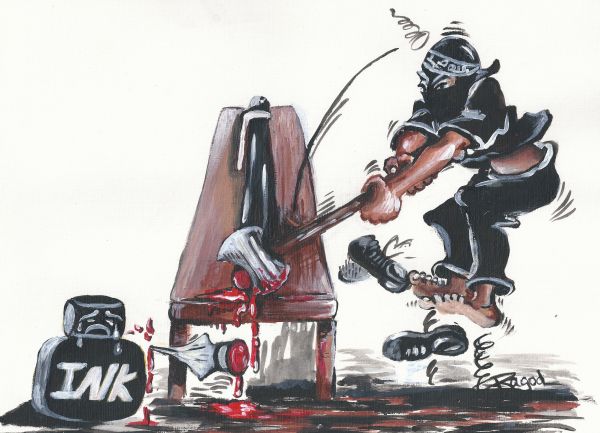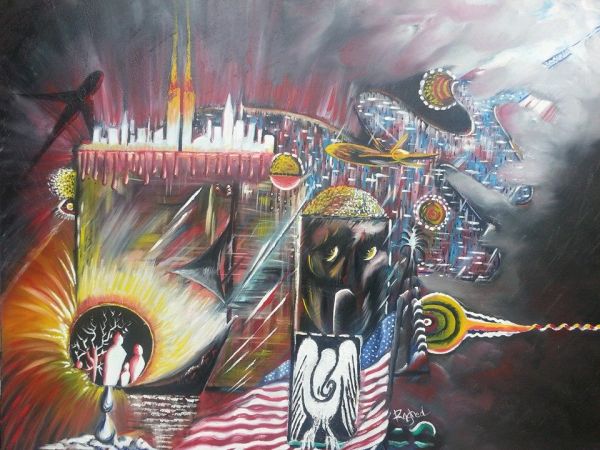Fine Living
Fine Living
Al Qubsiyat: The Syrian Secretive Islamic Women's Cult (Painting)
- Details
- Written by Fine Living
- Hits: 5516
Description of the painting (see inside)
This painting depicts a group of women gathered in a circle around their leader "Munirah Qubsia”. I got the idea of this circle while watching a video showing women gathered around her waiting on every move she made and every syllable she uttered. As usual I sketch any ideas for a new paintings right away before they disappear. I drew it and what came out is exactly what you see in the painting except for the 4 extra arms and the things the arms held, which I added later.
The figure in the middle depicts Munirah as the master of slaves. She has a hold on them mentally. But they aren't aware of it. The chains of Islam are invisible.
I depicted Munirah growing out of the Quran. Her roots are deeply ingrained in it, which is where her power comes from.
Write comment (159 Comments)Reflections on Muhammad’s Relations with Poets and Poetry
- Details
- Written by Fine Living
- Hits: 5997
Introduction
For the Arabs before Muhammad, poetry assumed the front-seat in whatever they faced or suffered in life. Pagan Arabs used poetry in keeping records of their genealogy, their exploits, history of their wars, and their personal history. Poetry was a mirror that reflected their lives with all of its ups and downs. Also the Arabs used poetry to convey their wisdom and knowledge.
They divided their poetry in two styles, ''al manthur" and “al manzum”:
- al manthur: poetry that rhymes but has an unstructured style.
- al manzom : classical poetry with a rhymed structure. Arabs had great respect for and valued dearly classical poetry. Classical poetry had a great influence on people and their lives.
“al manthur” style of poetry had lesser value in their eyes due to its everyday use. It was more common. Their classical poetry was valued more because it was more structured and not everyone was able to master it.
Pagan Arab tribes used to take pride in talented poets that they produced. Other tribes praised that tribe for having such a talented person in their midst. When a child was born in the tribe, or a stallion was born, its poets acted as an armor for the tribe by keeping its pride and honor in record by composing great poetry. Other tribes would have to think twice before making the tribe of a great poet angry. This is due to their fear that that poet might say and write poetry against, or make fun of, them. This was no ordinary matter. The reputation of a tribe, whose name was muddied due to such poetry, needed years of mending. For the Arabs, rhythmic word was powerful. A great poet had a great status in his own tribe as well as the ones around them.
Write comment (54 Comments)The Quran and Some of Its Origins in Arabic Poetry of Old
- Details
- Written by Fine Living
- Hits: 6542
Introduction
In this Article I like to expose some supposed miraculous facts, that came in the Quran. Muslims brag about the fact that the Qur’an was ahead of the times. They assert that the Quran mentioned scientific facts that were never discovered yet, and such facts came from an illiterate man; Muhammad.
The fact is the Quran was but a collection from earlier religions and myths that spanned the Middle East and Arabia regions. Muhammad also “borrowed” from existent Arab poetry.
It is this last part of the relation between the Qur’an and Arabic poetry that this article is interested in. Below, I show evidence that indeed Muhammad “pirated” from famous Arab poets.
Write comment (59 Comments)




